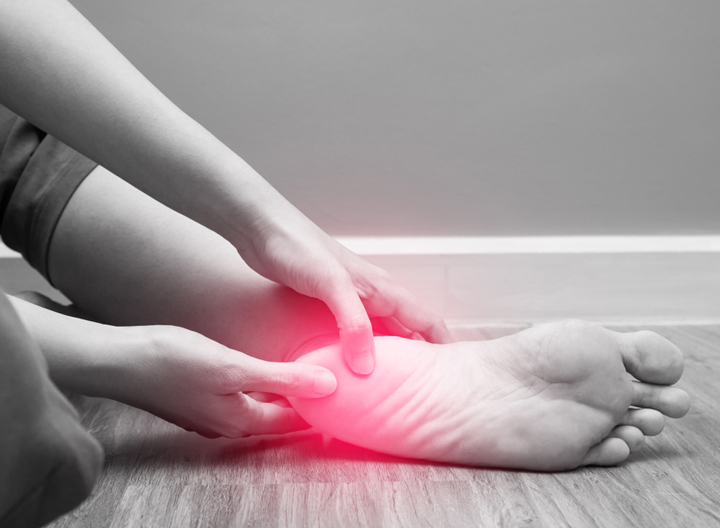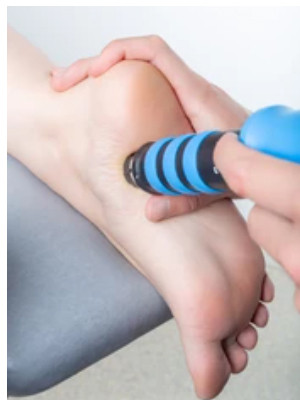|
Member of:-



|
|
|
About 10% of the adult population will suffer with heel pain at some time in their life.
Plantar Fasciitis
Plantar Fasciitis is an inflammation of the plantar fascia, a tight muscular band that runs along the sole of the foot. The site of pain may be under the heel, at the back or sides of the heel or in the arch of the foot.
Typically, a severe pain is felt first thing in the morning when taking the first few steps, or when rising from rest.

|
Treatment of Plantar Fasciitis
This condition often has its origin in a foot that is mechanically unstable. Therefore, accurate diagnosis of underlying mechanical faults using Computerised Gait Analysis and the prescription of advanced orthoses often leads to long term improvement of this condition. Shock Wave Therapy and Low Level Laser Therapy are also helpful in relieving the symptoms of this painful condition.
What is Shock Wave Therapy (ESWT) ?
Shock Wave Therapy (ESWT) is a mechanical wave that causes inflammation like changes in the treated area, stimulating the body’s healing processes. It is non-invasive and has few complications. Whilst the treatment can be uncomfortable, most patients tolerate the discomfort for the benefit it offers.
|

|
|
Studies show that over 70% of patients with chronic muscular conditions such as plantar fasciitis note a reduction in pain with the use of ESWT.
Tips to relieve the pain include:
- Roll an iced bottle of water up and down on the sole of the foot to reduce inflammation.
- Roll a tennis ball on the floor with your foot to massage the deep tendons of your foot.
- A course of anti-inflammatory medications (NSAIDS) can help and these are available on prescription from your GP.
|
Other conditions causing pain in the heel
- Tarsal Tunnel Syndrome
Compression of the tibial nerve as it passes the inside of the ankle can cause a burning sensation or tingling sensation within the heel and arch of the foot.
- Calcaneal Bursitis
The fluid filled fibrous sac (bursa) under the heel bone becomes inflamed. The pain is typically in the centre of the heel and becomes worse during the day. This condition often responds to ultrasound therapy but like plantar fasiitis, there is often also an underlying mechanical fault with the foot and therefore an orthotic is needed for long term relief.
- Achilles Tendonosis
Small tears can develop within the Achilles tendon causing a gradual swelling and pain within the heel. Exercises to strengthen the tendon and a increase in heel height with an insole can relieve the tendon to allow healing to take place.
- Severs Disease
This painful condition of the heel occurs in children, usually between the ages 8-12. It occurs when there is a temporary loss of blood supply to the heel bone. Whilst painful at the time, the condition often rectifies itself but may require protective padding in its acute stage.
- Chronic Inflammation of the heel pad
The heel pad may become reduced in thickness giving rise to a dull ache in the heel when standing and walking. Shock Wave or Low Level Laser Therapy followed by a shock absorbing insert in the shoes is often beneficial.
|
Remember – Your feet shouldn't hurt just because you have been standing or walking all day. If they are are troublesome seek professional help.
|
|
|
|



